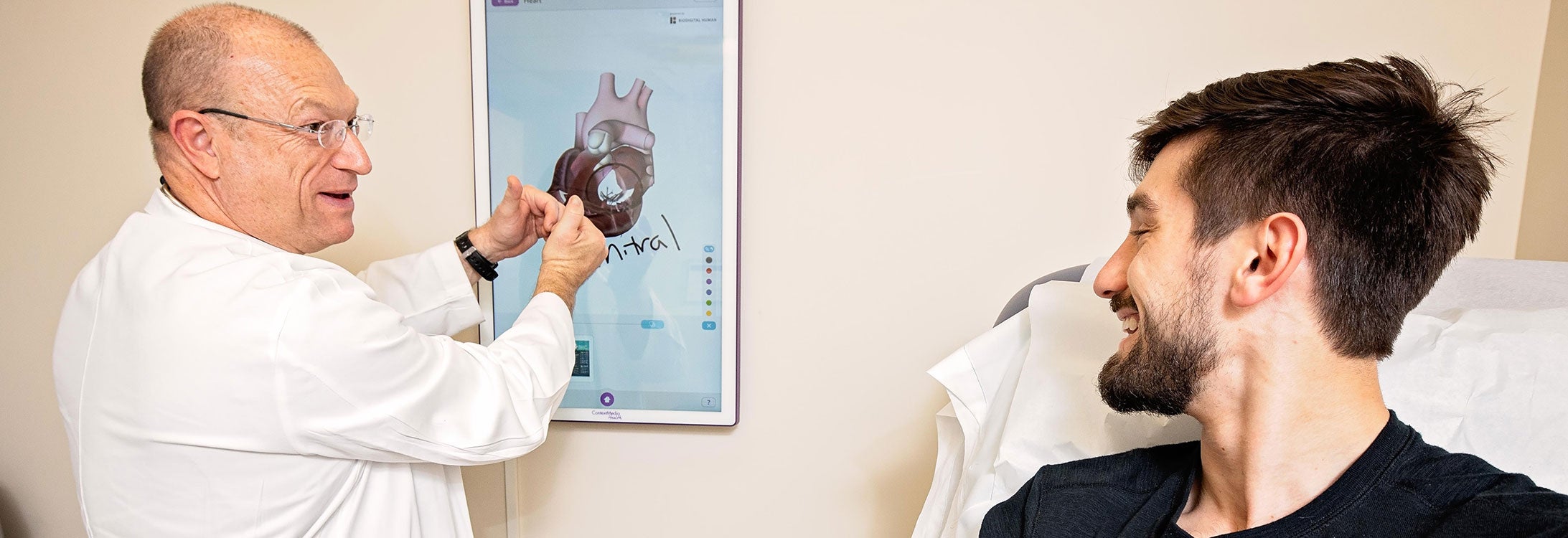Clinical Research
The Department of Cardiovascular Sciences is committed to the highest standards of excellence and integrity in all research endeavors.
Science attempts to understand the physical world by describing, defining, predicting and even controlling the conditions within it. Scientific understanding is based on objective and systematic observation of events and analytical reasoning.
Experimental research designs (such as clinical research) include random assignments of subjects to groups that experienced carefully controlled intervention according to logic about the effects of the drug or device being studied.
Current trials
The PARTNER II Trial : Placement of AoRTic TraNscathetER Valves Trial II. The Safety and Effectiveness of the SAPIEN XT™ Transcatheter Heart Valve.
*Portico Trial: Portico™ Re-sheathable Transcatheter Aortic Valve System US IDE Trial
US IDE trial
Transform Trial: Multi-CenTer Experience with the Rapid Deployment EDWARDS INTUITY Valve System FOR Aortic Valve ReplaceMent
*Coapt Trial: Cardiovascular Outcomes Assessment of the MitraClip Percutaneous Therapy for Heart Failure Patients with Functional
Mitral Regurgitation (The COAPT Trial)
Realism, Everest II Trial: A Continued Access Registry of the Evalve® MitraClip® System: EVEREST II Real World ExpAnded MuLtIcenter Study of the MitraClip System (REALISM).
*MACE Trial: Multi-center Prospective Study to Evaluate Outcomes of Moderate to Severely Calcified Coronary Lesions (MACE)
Relay: A Phase II Clinical Study of the Safety and Efficacy of the Relay™Thoracic Stent-Graft in Patients with Thoracic Aortic Pathologies
Benefit: A Phase I Clinical Study of the Safety and Performance of the Treovance Stent-Graft with Navitel Delivery System for Patients with Infrarenal Abdominal Aortic Aneurysms
SAPPHIRE WW: Stenting and Angioplasty with Protection in Patients at High-Risk for Endarterectomy
TAG Trial: Evaluation for the GORE Conformable TAG® Thoracic Endoprosthesis for Treatment of Traumatic Transection of the Descending Thoracic Aorta
Vitality Trial: Endovascular Repair Using the Talent™ Abdominal Stent Graft System in Abdominal Aortic Aneurysms
*Treovance II trial: A Phase II Clinical Study of the Safety and Performance of the Treovance Stent-Graft with Navitel Delivery System for Patients with InfrarenaL Abdominal Aortic Aneurysms
ProGeL: A Prospective, Controlled, Post-approval Study of ProGEL Pleural Air Leak Sealant in the Treatment of Visible Pleural Air Leaks after Standard Pleural closure
These are the various types of research designs:
- Clinical Research involves the evaluation of safety and effects of a new drug, device, biologic or preventive measure in humans comparing 2 or more products or processes.
- Observational Research involves observation of people in public places.
- Surveys, Questionnaires and Interviews involve statistical procedures used to make sure the sample population properly represents the overall population being studied.
- Epidemiologic Research involves identifying risk factors for particular diseases, conditions, behaviors or risks that result from particular causes (like environmental or industrial agents).
- Case Control Research involves the comparison of subjects with a specific condition.
- Longitudinal Research (prospective) involves the observation of events (diseases, behavioral, or physiological response). Subjects are observed over an extended period of time.
In the Department of Cardiovascular Sciences, both physicians and research nurses (coordinators) receive extensive training in how to conduct research at East Carolina University. They follow strict guidelines and processes established by both the federal government and the University. Before a patient can be enrolled in a clinical trial, each patient receives a full explanation about the study, questions and concerns are answered, and consent is entirely voluntary (known as Informed Consent). No patient is ever coerced into giving consent, and if the patient declines consent, there are absolutely no repercussions from either their physician or staff.
The Department of Cardiovascular Sciences is very proud of our research program and welcomes any questions you might have.
